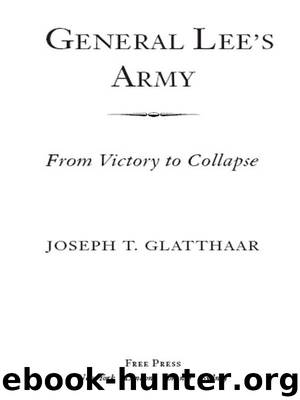General Lee’s Army by Joseph T. Glatthaar

Author:Joseph T. Glatthaar
Language: eng
Format: epub
Publisher: Simon and Schuster
Published: 2008-07-15T00:00:00+00:00
LEE’S MEN WENT through a typical progression of feelings over the course of the war, from worry and excitement, to shock, to cooler thinking, to, often, cynicism, and for some fear and desertion. In anticipation of their first exposure to combat, soldiers confessed all sorts of worries. They had unusual images of what it would be like, drawn from readings and conversations with veterans of previous wars and very early battles. A Virginia lieutenant naïvely assumed that the Confederacy would fight a giant battle in late May 1861. “When we do have one it will (in my opinion) be a most desperate one—a hand to hand fight,” he predicted. On the verge of First Manassas, a staff officer with Stonewall Jackson imbued with deep religious convictions wrestled with the conflict between fulfilling his obligation to the Confederacy and killing a fellow human being. “God knows if a stern duty ever compels me to take a human life,” he worried. “I shall not feel like exulting over it.” Colonel Dod Ramseur took his 49th North Carolina Infantry north to join in the Seven Days’ fight. After only two months of training, he admitted confidentially to his brother, “I do not put much confidence in my men.” The West Point graduate then explained, “They look scared & anxious.” The regiment fought on the periphery of the battle, and twice it was exposed to enemy fire. Compared with the devastating experience for other Rebel units, it was a gentle introduction to warfare, and his regiment behaved credibly under fire. 12
In that first fight, distinctive images became embedded in the minds of the soldiers. Launcelot Blackford came under rifled artillery fire, and he admitted to his mother, “It was about the first time I had ever heard them coming toward me, and though I was not I believe unduly discomposed, I thought all the while that I should be very glad when it was over.” A Louisiana lieutenant received his baptism by fire at Yorktown, and artillery loomed largest in his immediate memory as well. “I think the most unpleasant remembrances of the Strife are these same schrapnell shot,” he declared to his mother. “They get to us some seconds before the report of the powder that sent them so that the first thing we know of them [is] a shrill whistle unlike any thing you or I ever heard, before, then, the sharp bell-like crack of the bomb—the whistle of the little balls like bumble-bees—then the report of the Gun.” It all came so close together, though, that “it takes a very fine ear to distinguish which is first.” Georgia infantryman Eli Landers also tasted his first battle on the Peninsula. “It did not frighten me as bad as I expected,” he revealed, “but I tell you the bullets would whistle around my head I felt sort of ticklish.” Two days later, the Yankees attacked again, and this time “the bullets sung round our heads like mad bees.” 13
As soldiers gained more experience, they kept cooler heads before battle and acted more systematically.
Download
This site does not store any files on its server. We only index and link to content provided by other sites. Please contact the content providers to delete copyright contents if any and email us, we'll remove relevant links or contents immediately.
The Mikado Method by Ola Ellnestam Daniel Brolund(23567)
Hello! Python by Anthony Briggs(22702)
Secrets of the JavaScript Ninja by John Resig Bear Bibeault(21523)
Kotlin in Action by Dmitry Jemerov(20566)
Dependency Injection in .NET by Mark Seemann(20488)
The Well-Grounded Java Developer by Benjamin J. Evans Martijn Verburg(20383)
OCA Java SE 8 Programmer I Certification Guide by Mala Gupta(19535)
Algorithms of the Intelligent Web by Haralambos Marmanis;Dmitry Babenko(18333)
Grails in Action by Glen Smith Peter Ledbrook(17458)
Adobe Camera Raw For Digital Photographers Only by Rob Sheppard(16976)
Test-Driven iOS Development with Swift 4 by Dominik Hauser(11240)
Becoming a Dynamics 365 Finance and Supply Chain Solution Architect by Brent Dawson(8071)
Microservices with Go by Alexander Shuiskov(7841)
Practical Design Patterns for Java Developers by Miroslav Wengner(7739)
Test Automation Engineering Handbook by Manikandan Sambamurthy(7704)
Angular Projects - Third Edition by Aristeidis Bampakos(7182)
The Art of Crafting User Stories by The Art of Crafting User Stories(6642)
NetSuite for Consultants - Second Edition by Peter Ries(6561)
Demystifying Cryptography with OpenSSL 3.0 by Alexei Khlebnikov(6326)
